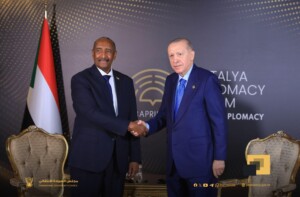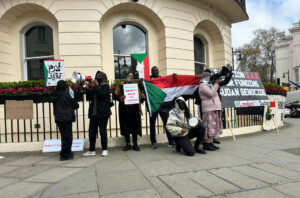The decision of the President of the Sovereignty Council Abdelfattah El Burhan to freeze trade unions and professional syndicates has sparked mixed reactions among politicians and trade unionists.
On October 24, Sudan’s Supreme Court decreed the reinstatement of the unions and federations that were dissolved by the now-disbanded Empowerment Removal Committee* in March 2019 and cancel all the procedures that resulted from ERC’s work. These unions have now been suspended again.
El Wasig El Bereir, Secretary General of the National Umma Party and leading member of the mainstream Forces for Freedom and Change that is currently negotiating a new government with the military junta, commented by saying that El Burhan’s decision to freeze all activities of the trade unions and syndicates, professional federations, and the Employers’ Federation, has both positive and negative outcomes.
In an interview with Radio Dabanga, he said that “the decision blocks the way for Islamist entities to control the unions, but at the same time does not return the unions to the steering committees formed after the revolution”.
He made it clear that the decision will not affect the political process based on the draft of a transitional constitution put forward by the Steering Committee of the Sudanese Bar Association (SBA).
Ashraf Abdelaziz, editor-in-chief of El Jareeda newspaper, said that El Burhan’s decision to freeze trade unions “comes in conjunction with preparing the climate for signing the agreement between the FFC-CC and the military”.
He explained to Radio Dabanga that the return of the former SBA would have led to the loss of legitimacy in the organisation’s draft constitution, which would affect the negotiations.
He described the decision as “improper.” However, he considered it a good step which should be welcomed, in order to make way for further steps in the future.
Mahjoub Kanari, a union leader, denounced the “interference by the state in union affairs.” Kanari explained to Radio Dabanga that the case of the unions should be legally resolved, “either by the members through general assemblies or by law.”
He said that El Burhan resorted to freezing the decision over trade unions because the decisions of Judge Mohamed Babiker, better known by his nickname Abu Sabiha, and his affiliates to restore the trade unions formed during the regime of ousted President Al Bashir put the state in a real dilemma. He accused El Burhan of looking to control the trade unions by appointing steering committees to officially take over the tasks through rigged elections.
Kanari called on all trade unions to resist the decision by holding general assemblies and electing their own unions, so that the trade union movement returns to what it was in the past.
Members of the former regime’s Lawyers Syndicate violently confronted members of the SBA steering committee on November 1. Following the event, Lawyer Sati El Haj, a member of the SBA defence team, said that they “are targeting progressive unions, especially the Sudanese Journalists Syndicate, the SBA, and the Sudanese Engineers Union”.
The attack came after the SBA announced its rejection of the decision by the Supreme Court’s Appeals Committee to reject their appeal and thus reinstate Bashir-allied trade unions.
On October 23, Sudan’s Humanitarian Aid Commission (HAC) cancelled the registration of the Sudanese Consumer Protection Society, after telecom companies cut off the internet connection of the Association despite a number of official complaints.
The controversial cancellation came almost two months after the HAC allowed the re-registration of 23 non-governmental organisations and associations which “represent hidden facades” of the dissolved NCP.
In mid-November, Radio Dabanga interviewed a number of farmers involved in the El Gezira Agricultural Scheme who were discussing unionising. Farmer Heisam El Sawy called for a return of the Farmers’ Union. He said that “the experience of a farmers’ union is marred by stigmas because the former leaders of the union were appointed by the regime of ousted President Omar Al Bashir.”
Since last October’s military coup, Sudanese state ministers and officials have resorted to practices used by the former regime of dictator Omar Al Bashir, such as piling on bureaucratic procedures to extract profit and attempting to interfere in NGO procurements, according to aid workers, experts, and UN agencies.
In July, Radio Dabanga reported that the violent suppression of freedoms that characterised the 30-year regime of Omar Al Bashir is increasing again at all levels of society, along with friendly ties between the military and Al Bashir’s ousted National Congress Party (NCP).
Under Al Bashir, the HAC was staffed by security officers who frequently denied access to INGOs and treated foreign aid workers as western spies.
Applications for Sudanese NGOs were often refused or given after “extra fees” were paid. HAC and security officers also regularly attended workshops and training, often in disguise. This caused the prominent NGO Sudanese Organisation for Research and Development (SORD) to temporarily register as a company instead of an organisation.
 Protest of unions and professionals organisations in front of the Labour Organisations Registrar on June 26 against the reinstatement of Al Bashir affiliated unions (File photo: Social media)
Protest of unions and professionals organisations in front of the Labour Organisations Registrar on June 26 against the reinstatement of Al Bashir affiliated unions (File photo: Social media)











 and then
and then